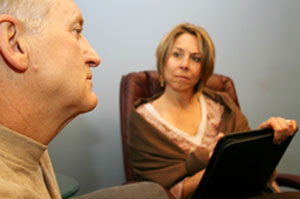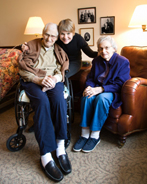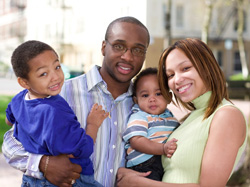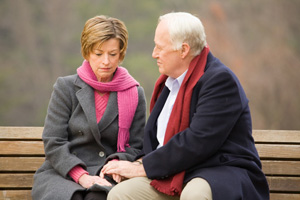|
|
|
|
| |
| You Are Here: Home > Survivorship > Relationships |
|
Survivorship
In this section:
|
|
Relationships
Relationships are the bedrock of all of our lives. They bring us love, joy, stability and happiness. They come in a wide variety of ages, sexes and include people related to us and not. They include our friends, partners, families, neighbors and work associates.
|
|
“Whether you encounter problems with your relationships often depends on the strength of the relationships beforehand. Relationships that were already strained tend to continue that way after cancer, sometimes completely falling apart. Strong relationships can become even stronger through the cancer experience.” –Mayo Clinic
This section discusses the following topics:
- Intimacy
- Sexuality
- New relationships
Intimacy
Loneliness and isolation have been reported as common feelings for many people affected by cancer. Loved ones play an important role in offering support.
|
|
|
|
| |
| |
| At the same time, the disease experience brings up many issues for patients and loved ones alike, and it is not uncommon for challenges to arise in relationships during, after, and in association with the cancer experience. |
Common Relationship Challenges
-
Changing responsibilities
You may not be able to perform certain tasks during treatment at home and in other parts of your life.
After treatments, your loved ones might expect you to resume those responsibilities even if you do not feel capable.
-
Changing roles
If you were a take-charge, independent, “I can do everything myself” kind of person before cancer, you may find it difficult to have to rely on others and be uncomfortable asking for help during treatment.
Further, deciding when and how to switch back can be confusing and awkward.
|
| |
|
- Giving you too much attention
Some loved ones might smother you with good intentions. They might insist on doing things for you when no assistance is needed. They love you and want to help, but in fact they’re too helpful.
- Being nosy
Some people ask a lot of questions. Sometimes more than you’re comfortable answering.
|
| Common Relationship Solutions |
| |
 |
- Start the conversation
Some people might want to ask how you are feeling and about your cancer experience. Often they do not know exactly what to say, or they think they’ll upset you.
Start the conversation yourself. Let people know what you want to talk about, whether or not you welcome questions that moment or day, or if you don’t wish to talk about anything related to cancer at that time.
|
|
|
| |
Also help your loved ones transition from the somber mood of cancer to the loving, fun mood of more normal conversation.
Be honest. Tell people when you do not want to answer questions. Sometimes you may want to avoid answering uncomfortable questions by changing the subject or redirecting the conversation. Set rules. Some people place limits on the times they will talk about their cancer.
- Accept help
Loved ones might ask what they can do to help you. You might consider planning ahead to identify ways for people to help.
- Identifying "help" that isn't helpful
Some people in your life may try to tell you stories about other peoples' experiences with cancer that you find unhelpful or frightening. Distance yourself from well meaning people who do not get the message that their good intentions are hurting you.
People can “do” things for you (run errands, make food, join you for appointments, take you to the movies), as well as “be” with you (listen to how you feel, share a cup of tea, hold your hand).
- Let others know what to expect of you
Be honest about what you can and cannot do. Tell your loved ones what to expect from you, and recognize that energy levels and capabilities ebb and flow during the cancer experience.
- Keep the friendships that matter
Some people will not step up to the plate during your cancer experience. Try not to spend energy focused on patching up relationships that were not strong to begin with. Invest your time and energy in the friends who are closest to you.
|
| |
 |
- Be patient with others
Sometimes people will annoy you with their awkwardness around your cancer.
Remember that most people have good intentions. They may not know the right things to say or do, and therefore their words and actions may seem inappropriate or critical. Their awkwardness may come from unfamiliarity with the situation. With time and patience, things may improve.
|
|
|
| |
- Stay involved when you can
Some loved ones might not invite you to participate in social activities since they assume you are not ready. Communicate your desires and tell these people if you want to be included.
- Try support groups
Many cancer survivors report that they sometimes feel people who have not had cancer cannot understand their experiences. You might consider talking about your feelings with other cancer survivors in a support group or on websites. Support groups are also available for cancer survivors' friends and family.
- Consider professional help
You might ask your doctor for a referral to a counselor or therapist for more help. He or she may have ideas on ways to better communicate with your friends and family.
|
| |
Sexuality
Cancer treatments, along with the disease experience, impact sexuality for both men and women. |
| |
 |
People with cancer may feel less sexual. Some feel a need for more sex. They may feel an increased need for touch, but not want sexual contact.
Other people with cancer may have discomfort with physical contact because of their sense of vulnerability or treatment side effects.
Some will become very sensitive to changes in their partner's desires for sexual and other contact.
|
|
|
|
CISN recommends:
- Communicating with your sexual partner and even exploring new forms of intimacy.
- Speak honestly with your health care team about any sexual issues that might be linked to side effects. Many treatments have known side effects influencing sexual function. Medical interventions may be available.
For Women
Overview:
Women being treated for breast, gynecologic, and pelvic cancers are most likely to experience side effects that make having sex painful or difficult. Additionally women with breast cancer who have had a breast removed may struggle with self-image difficulties which may impact their sexual life.
The treatment, type, and stage of cancer will determine whether you experience sexual side effects. Although not all women experience these side effects, the most commonly reported side effects among women treated for any cancer include the following:
- Difficulty reaching climax
- Loss of desire for sex
- Pain during penetration
- Reduced size of the vagina
- Vaginal dryness
Cancer Treatments and Sexual Side Effects
The following sexual side effects may be short or long term.
- Surgery
Surgical impact on sex depends on the type, location, and size of the cancer. Surgical procedures that are likely to cause sexual side effects include radical hysterectomy, radical cystectomy, abdominoperineal resection, and vulvectomy.
|
| |
|
- Chemotherapy
- Loss of libido during and after chemotherapy
- Loss of sexual desire due to fatigue, nausea, hair loss, and weight loss or gain
- Loss of estrogen production in the ovaries leading to symptoms of menopause, such as a thinning vagina (vaginal atrophy) and vaginal dryness, both of which can cause pain during penetration
- Hormone therapy
Both medications and surgery for hormonal cancers cause menopausal signs and symptoms, including vaginal atrophy and dryness.
For Men
Men with cancer in their pelvic area are more likely than men with other cancers to report difficulty resuming sex after cancer treatment. Sexual side effects are most common after treatment for bladder, colon, prostate, and rectal cancer.
|
| |
 |
Older men, especially those over 60, are more likely to experience sexual dysfunction after cancer treatment since most older men experience difficulty with sex due to aging.
However, cancer treatments may accelerate sexual side effects associated with normal aging. |
|
| |
The most commonly reported sexual side effects among men include the following.
- Inability to achieve or maintain an erection (erectile dysfunction)
- Difficulty climaxing
- Orgasm without discharge of semen (dry orgasm)
- Weaker, less satisfying orgasms
- Loss of libido
- Pain during sex
Cancer Treatments and Sexual Side Effects
The following sexual side effects may be short or long term.
- Surgery
Nerves in the pelvic area control blood flow to the penis. Surgeons work to avoid accidentally damaging nerves when operating on tumors in the pelvic area. A severed nerve can lead to weakened erections or the inability to achieve an erection.
Surgeries that may cause erectile dysfunction include abdominoperineal resection, radical cystectomy, radical prostatectomy, and penectomy.
- Radiation
Radiation aimed at the pelvis can cause erectile dysfunction, although doctors do not know exactly why. Radiation may damage nerves in your pelvic area, block blood flow to the penis, or decrease testosterone levels in the body. Radiation’s side effects start slowly, about six months to a year after treatment.
The amount of radiation and extent to which the pelvic area is treated influences the level of erectile dysfunction.
Men who smoke or who have a history of heart disease, high blood pressure, or diabetes also may be at a higher risk of erectile dysfunction after radiation therapy. These conditions may have already caused some artery damage,
which can worsen with radiation.
- Chemotherapy
Chemotherapy may cause a loss of libido and difficulty achieving an erection after treatments. Some chemotherapy drugs reduce the amount of testosterone the body produces. These sexual functions usually come back within a few weeks of ending treatment.
- Hormone therapy
Hormone therapy most commonly causes a loss of libido, but not in all men. Some men find that they have a desire for sex, but are unable to have an erection or are unable to climax. Younger men tend to have fewer sexual side effects from hormone therapy.
CISN Tip:
Explore new modes of sexual expression or intimacy. You, with or without your partner, can explore new options for fulfillment. Many bookstores offer a wide range of books and CD's that can help you explore intimacy in new ways. These might include couples massage using lubricants, sensual touching that focuses on closeness rather than orgasm, exercises to help strengthen weak pelvic muscles and couples counseling. Your old sex life might be gone but a new different one can spring up in its place.
New Relationships
Like all other life-altering events, cancer can also lead the way to new relationships and ways of living.
Support Groups
Many cancer survivors enter support groups to help them cope with the various aspects of their diagnosis. Through these support groups, new friends and interests sometimes blossom. New ways of dealing with adversity also may develop.
Survivors often find a “silver lining” in their diagnosis. As in every aspect of the cancer journey, this will be highly individual.
CISN Tip:
Although receiving a cancer diagnosis is shocking and frightening, it can also be life changing in a positive way. Be bold! Try new things! Go to our Inspirational section to read about what some survivors think and do after their cancer diagnosis.
Advocacy
Some survivors decide to spend some or all of their time being an advocate for others. We encourage you to explore our Advocate section to learn more about the world of advocacy.
This is a very rewarding way to move past your pain by helping others.
For More Information:
Additional Reading:
|
| |
|
|
| |
|
|
|
| |
|
|
| |
| Copyright © 2006-2013 CISN - All Rights Reserved. |
| |
| Site Design by: Studio457 |
| |
|












